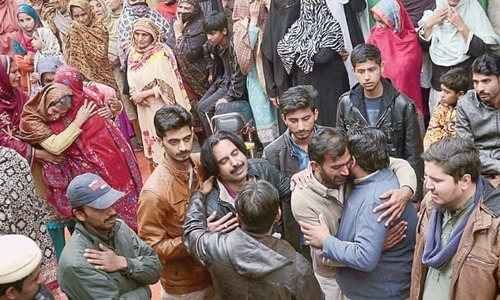ISLAMABAD: Punjab’s Additional Chief Secretary Fazeel Asghar on Wednesday, while briefing the Senate Functional Committee on Human Rights, conceded that the Counter Terrorism Department (CTD) made blunders during the Sahiwal incident, and there had been a number of alternative ways to find out whether children were seated in the vehicle.
However, he added, the video statement of the child, who said that his father had offered money to the CTD officials but they killed him nevertheless, was incorrect and suggested waiting for the report of the Joint Investigation Team (JIT) to get a clear picture.
Know more: Punjab govt terms family's killing in Sahiwal encounter 'collateral damage'
Contrary to the 16 officials that were mentioned in the FIR, Mr Asghar also claimed that in the incident were involved only six officials, including a sub-inspector and five constables, including a driver. Mr Asghar, who has constituted the JIT, elaborated that he could tell in advance that the JIT would declare the driver of the car, Zeeshan, a ‘terrorist’, Khaleel and his family innocent, and would pin the responsibility on six officials.
“The car that was being driven by Zeeshan was owned by the Naib Amir of Daesh [the militant Islamic State group], Adeel. The agencies had identified the car two days prior to the incident, as it was parked in a street, but the agencies failed to identify the house in which Zeeshan was residing. However on Dec 19, the car disappeared and could not be traced despite the 8,000 CCTV cameras in Lahore. But at 9:30am a camera at Manga Mandi identified the number plate of the car and generated an alert. It took an hour to convey the message to an intelligence agency,” he said.
Punjab’s additional chief secretary says Counter Terrorism Department made blunders, but acted on terror alerts
He said it was believed that all persons were wearing suicide jackets due to which officials shot them rather than making arrests. He also claimed that Zeeshan opened fire at CTD officials.
“Two calls from Afghanistan have been tracked down, which prove that not only were Adeel and Zeeshan acquainted with each other but that Zeeshan was also member of the IS, as the second call said that a member of the militant group had been killed. Moreover, a SIM, recovered from Adeel who was killed earlier in Faisalabad, showed that Adeel had visited Zeeshan’s house,” he said. Mr Asghar added that at least one ‘terrorist’ was killed every six to seven days, and if the facts were shared with parliamentarians, they would not be able to sleep.
Senator Ayesha Raza Farooq said that after getting the briefing she had become even more concerned, explaining that Zeeshan ought to have been arrested to obtain information. She also expressed the fear that now, six officials would be made scapegoats and action would not be taken against the senior persons implicitly responsible.
Chairman of the committee Mustafa Nawaz Khokhar said that the child had given a statement that his father offered money to officials of the CTD but they killed him nevertheless, raising the question that if that conversation was possible, why had the CTD officials not made arrests.
Mr Asghar’s reply was that the statement was incorrect and that the matter ought to be left to the JIT to determine.
However, Senator barrister Muhammad Saif said that he believed that the immediate statement of a person, especially a child, could not be wrong, adding that the police should not have established the JIT. “The crime scene has been compromised and if a weapon was recovered, it can be tampered with. Police officer Rao Anwar carried out fake encounter killings. In a meeting of the Interior Committee, the Pakistan Telecommunications Authority claimed that now calls cannot be made from Afghanistan but here it is being briefed that two calls from Afghanistan, were recorded,” he said.
The committee unanimously agreed that the JIT culture must be abolished, with members concurring that a parliamentary judicial commission should be established to address the issue.
Published in Dawn, January 31st, 2019













































